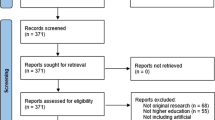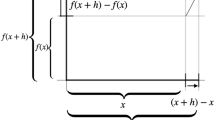Abstract
How do teachers conceptualize and deal with context of mathematics word problems in their teaching? This question is discussed based on a study of 14 experienced teachers at the elementary, junior high and senior high school levels. Bruner’s notions of paradigmatic and narrative modes of knowing formed the basis of analysis of data from sources that include interviews and classroom observations. The findings highlight the teachers’ conceptions of problem context and teaching approaches for each of these modes of knowing. All of the teachers used the paradigmatic mode in their teaching but with different depth and most engaged in some form of the narrative mode to create a classroom environment that was motivational for students to learn word problems. The paper also highlights characteristics of these two modes as they relate directly to word problems and discusses implications for instruction, learning and teacher development.
Similar content being viewed by others
References
Barwell, R.: 2003, ‘Patterns of attention in interaction of a primary school mathematics student with English as an additional language’, Educational Studies in Mathematics 53(1), 35–59.
Boaler, J.: 1994, When do girls prefer football to fashion? An analysis of female underachievement in relation to ‘realistic mathematics' contexts’, British Educational Research Journal 20(5), 551–564.
Brown, S.I.: 1984, ‘The logic of problem generation: From morality and solving to de-posing and rebellion’, For the Learning of Mathematics 4(1), 9–20.
Buerk, D.: 1986, ‘The voices of women making meaning in mathematics’, Journal of Education 167(3), 59–70.
Bruner, J.: 1985, ‘Narrative and paradigmatic modes of thought’, in E. Eisner (ed.), Learning and Teaching the Ways of Knowing, University of Chicago Press, Chicago, IL, pp. 97–115.
Bruner, J.: 1986, Actual Minds, Possible Worlds, Harvard University Press, Cambridge, MA.
Creswell, J.W.: 1998, Qualitative Inquiry and Research Design: Choosing Among Five Traditions, Sage Publication, Thousand Oaks, CA.
Contreras, J.N. and Martinez-Cruz, A.M.: 2001, ‘An investigation of preservice elementary teachers' solution processes to problematic story problems’, in M. van den Heuvel-Panhuizen (ed.), Proceedings of the 25th PME Conference 2, 289–296.
Cummins, D.: 1991, ‘Children's interpretation of arithmetic word problems’, Cognition and Instruction 8(3), 261–289.
Davis-Dorsey, J.: 1991, ‘The role of rewording and context personalization in the solving of mathematical word problem’, Journal of Educational Psychology 83(1), 61–68.
DeFranco, T.C. and Curcio, F.R.: 1997, ‘A division problem with a remainder embedded across two contexts: Children's solutions in restrictive versus real-world settings’, Focus on Learning Problems in Mathematics 19(2), 58–72.
Freudenthal, H.: 1978, Weeding and Sowing, D. Reidel Publishing Company, Dordrecht.
Gilligan, C.: 1982, In a Different Voice. Harvard University Press, Cambridge.
Greer, B.: 1997, ‘Modelling reality in mathematics classrooms: The case of word problems’, Learning and Instruction 7(4), 293–307.
National Council of Teachers for Mathematics: 1989, Curriculum and Evaluation Standards for School Mathematics, NCTM, Reston, Virginia.
National Council of Teachers of Mathematics: 1999, Principles and Standards for School Mathematics, NCTM, Reston, Virginia
Nesher, P. and Hershkovitz, S.: 1997, ‘Real world knowledge and mathematical knowledge’, in E. Pehkonen (ed.), Proceedings of the 21st Conference of PME, 3-280-287.
Schoenfeld, A.H.: 1991, ‘On mathematics sense making: An informal attack on the unfortunately divorce of formal and informal mathematics’, in J.F. Voss, D.N. Perkins and J.W. Segal (eds.), Informal Reasoning and Education. Lawrence Erlbaum Associates, Hillsdale, New Jersey, pp. 311–343.
Silver, E., Shapiro, L. and Deutsch, A.: 1993, ‘Sense making and the solution of division problems involving remainders’, Journal of Research of Mathematics Education 24(2), 117–135.
Silver, E.A. and Smith, J.P.: 1980, ‘Think of a related problem’, in S. Krulik and R.E. Reys (eds.), Problem Solving in School Mathematics, NCTM, Reston, Virginia, pp. 146–156.
Suydam, M.N.: 1980, ‘Untangling clues from research on problem solving’, in S. Krulik and R.E. Reys (eds.), Problem Solving in School Mathematics: 1980 Yearbook, NCTM, Reston, Virginia, pp. 34–50.
Verschaffel, L., De Corte, E. and Borghart, I.: 1997, ‘Pre-service teachers' conceptions and beliefs about the role of real-world knowledge in mathematical modeling of school word problems’, Learning and Instruction 4, 339–359.
Verschaffel, L., Greer, B. and DeCorte, E.: 2000, Making Sense of Word Problems, Swets and Zietlinger Publishers Lisse, The Netherlands.
Verschaffel, L.: 2002, ‘Taking the modeling perspective seriously at the elementary level: Promises and pitfalls’, in A.D. Cockburn and E. Nardi (eds.), Proceedings of the PME 26, University of East Anglia, Norwich, 64–80.
Author information
Authors and Affiliations
Corresponding author
Rights and permissions
About this article
Cite this article
Chapman, O. Classroom Practices for Context of Mathematics Word Problems. Educ Stud Math 62, 211–230 (2006). https://doi.org/10.1007/s10649-006-7834-1
Issue Date:
DOI: https://doi.org/10.1007/s10649-006-7834-1




